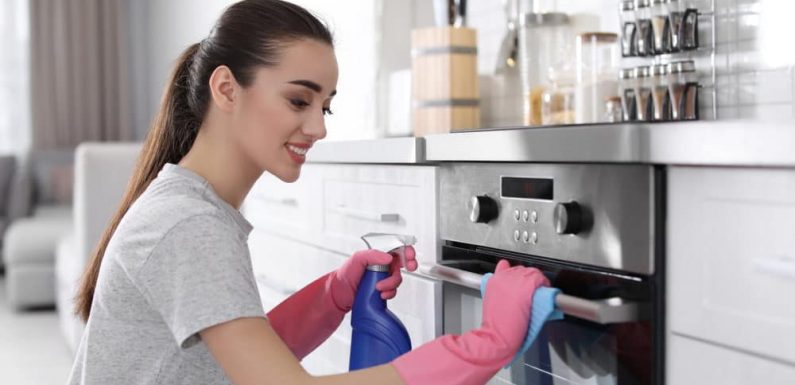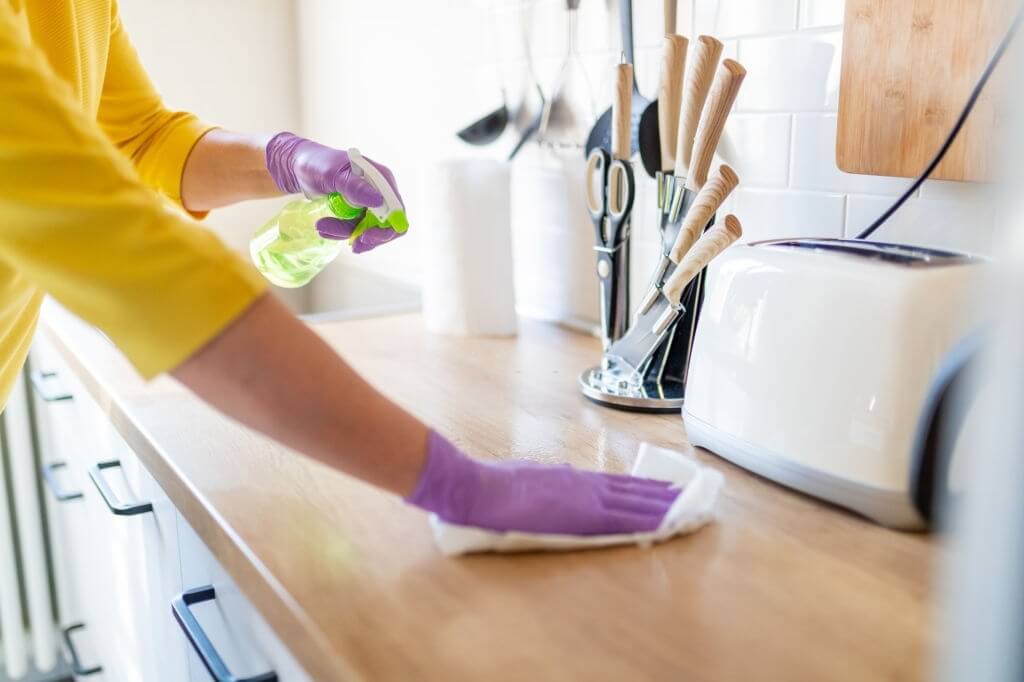
Countertops are designed to withstand a lot of wear and tear, especially the kitchen counter. But that does not mean that we can use any cleaning solution on the countertop. We have often seen many people use oven cleaners to clean their countertops. If you are one of them, you are not cleaning your countertop. Instead, you are devouring what is the effect of oven cleaner on kitchen countertops. And here we tell you why.
Why shouldn’t we use an oven cleaner on kitchen countertops?

Oven cleaners liquefy the protective finish of the countertop and reach the material, damaging the appearance. Furthermore, they also weaken the structure and increase the risk of food contamination. Among many harmful cleaners for your countertop, oven cleaner is the worst option. Keep reading: How to clean cricut mat?
In addition to being harmful to your countertop, oven cleaners also negatively affect your health. You may not have direct contact with these products, but use oven cleaners to clean the counter where you have a meal for your family. In fact, some of the ingredients they contain are classified as carcinogenic by the United States OSHA (Occupational Safety and Health Administration). So indirectly, you are coming into contact with harmful substances, which are also harmful.
That is why it is recommended to clean your countertop with mild soap. Ceaserstone has a detailed section on how to care for and maintain your countertops. Oven cleaners often contain alcohol and caustic soda; both substances are corrosive and harmful.
Caustic soda is a common ingredient found in oven cleaners, drain plugs, paint strippers, etc. In addition, it is also used to decompose animal carcasses. This clearly means how powerful bleach is as a corrosive agent. When used on the bench, it can remove paint and seal.
The alcohol in oven cleaners comes in two forms, including monoethanolamine and ethanol. Therefore, a product can contain one or both types of alcohol. But both forms are powerful solvents that can cause permanent discoloration of your countertop, which is made of synthetic materials. Although the effect of alcohol is not visible on tile or stone, it does affect the finish of the wood countertop.
Which countertops are most affected by oven cleaners?
Although oven cleaners affect all types of countertop materials, the following are the materials most affected:
Stone countertops
Stone countertop materials, such as polished granite, marble, etc., have high durability compared to other materials in terms of cleanliness. But they should not be cleaned with oven cleaners, as they can have harmful consequences. Stones are materials of natural origin and when they interact with harmful chemicals, the results are not good. Cleaner ingredients can dull the finish and stain the topcoat.
Quartz material presents an increased risk of discoloration and degradation. This is because quartz is a manufactured stone created with the use of added colors and pigments. Artificial colors are more vulnerable to color damage when exposed to oven cleaning chemicals.
Stainless steel countertops
Stainless steel is a common countertop material in a contemporary kitchen. They are resistant and easy to clean. That is why we see them in professional kitchens. However, using an oven cleaner is not the way to test the strength of this material. Cleaning your stainless steel countertop with an oven cleaner can cause stains on the countertop surface. Also, stains can interact with food prepared on the surface. Read easy tricks on how to tighten kitchen faucet.
Tile countertops
Tile is not a common countertop material known for its durability. However, cleaning tile countertops with an oven cleaner is not recommended. Harmful substances in the cleaner can ruin the top finish, thus affecting its appearance.
Wooden workbench
Using an oven cleaner on a wooden kitchen countertop is not a safety measure. You should avoid using such harmful cleaning products if the wooden surface is covered with a laminate sheet. Also, you may see a bubbling reaction when the wood is exposed to the oven cleaner. This can completely ruin the countertop and you may need to do a lot of repairs.
What to do with the stains that the oven cleaner causes on the countertop?
If you’ve used an oven cleaner on your countertop and want to control the damage, here are a few options:
A mixture of water and baking soda: If the stain forms on a wood or granite countertop, a solution of water or baking soda can be used. Baking soda is a thick material, so you should never rub it on your countertop. Instead, apply the paste to the stain, cover it with plastic wrap, and let it sit for a few days.
Beeswax: Oven cleaners must have left a white stain on the wood countertop and laminate. You can remove this by gently buffing the stain with beeswax. It helps to restore the shine to the countertop and adds a protective layer that does not allow water and bacteria to penetrate the surface. You can use colored polishing oils for the job if beeswax is not available.
Vinegar: You can treat a stained kitchen counter with vinegar if you’ve used oven cleaner. The acidic nature of vinegar will help neutralize the bleach and delay damage.
Baking soda and washing powder: It is a great home remedy to treat light spots. Gently rub the mixture over the stained area with a microfiber cloth. Move-in the direction of the fiber in question for maximum benefit.
The bottom line
The strong chemical in oven cleaners is perfect for removing all grease and dirt from the oven. However, using the same solution to clean your kitchen counter is never a good idea. While you can do everything you can to keep your kitchen surface from stains and splashes, there are gentler and safer ways to do the same.
What is the effect of oven cleaner on kitchen countertops? You can usually clean the countertop with mild soap and a soft cloth. Make sure to dry the countertop after cleaning is finished, so moisture doesn’t get on the surface, and if you’re using a cleaning product, make sure it’s safe to use on the countertop.

